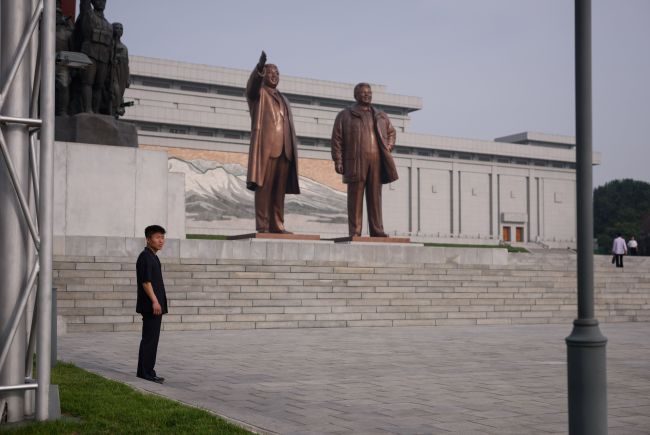N. Korea's human rights conditions overshadowed by nuclear issues
By Jung Min-kyungPublished : June 28, 2018 - 16:18
With the world’s attention focused on North Korea’s denuclearization, concerns are mounting that the country’s human rights abuses could be overlooked.
The summit agreement reached between US President Donald Trump and North Korean leader Kim Jong-un on June 12 did not include clauses on improving the much-criticized human rights conditions in North Korea. The same goes for the result of the inter-Korean summit in April.
Trump even publically downplayed the issue when pressed by Fox News about North Korea’s human rights record as he was leaving Singapore, following the June summit.

He said that while Kim may have done some bad things, “a lot of other people (have) done some really bad things” and even lauded the young North Korean leader as a “tough guy” and a “great negotiator.”
This was a clear shift from last year, when the US Treasury Department blacklisted seven senior North Korean officials, including leader Kim Jong-un’s sister, Kim Yo-jong, over “severe” human rights abuses and censorship. The death of American student Otto Warmbier in June 2017 also drew criticism from the international community, after his parents accused North Korea of torturing their son. He was detained in the communist state for 15 months.
“For President Trump, it’s not about solving ‘North Korean issues’ but ‘North Korea’s nuclear issues,’” said Cho Han-bum, a researcher at the Korea Institute for National Unification.
“It would be burdensome for him to raise human rights in talks with North Korea, when he is aiming for a swift negotiation with North Korea in achieving denuclearization, while the North is clearly reluctant to acknowledge its human rights record.”
North Korea’s move to release three American detainees in May and its decision to return the remains of US soldiers who died in the 1950-53 Korean War are also fueling worries that it may sidetrack the international community from the humanitarian issues regarding North Korea.
According to a 2014 UN inquiry report, the North Korean government not only controls access to food, but tortures and sends people to political prison camps, and is behind “enforced disappearances,” including in “the form of abductions of nationals of other states.”
The North Korean defector population in South Korea and around the globe are living proof of the atrocities, as they risked their lives to earn the freedom to speak, act and live.
Regarding changes that North Korea’s denuclearization might bring to its human rights conditions, Ahn Chan-il, a former North Korean military officer who heads the World Institute for North Korea Studies in Seoul, expressed skepticism that it would improve upon such changes as full dismantlement of its nuclear program or economic opening.
“Improving human rights conditions for North Korea means closing political prison camps and releasing prisoners back to society,” Ahn told The Korea Herald.
It is estimated that between 80,000 to 120,000 political prisoners are detained in four large North Korean prison camps, according to a 2014 UN report.
“But those who return to society could grow to become a significant threat to the security of the current regime -- they were sent to the camps because they were deemed as threats in the first place,” he added.
Regime security is what North Korea has been prioritizing in negotiations with the US.
Though layers of economic sanctions against the country are yet to be lifted, North Korea is believed to be seeking normalization of diplomatic ties with the US and economic opening to attract foreign business and capital.
On the Korean Peninsula, activists and critics have also been criticizing the liberal Moon Jae-in administration’s lack of efforts to confront human rights issues in fear that it would ruin the mood of an inter-Korean detente. Projects that could tackle conditions in the North have been losing ground.
South Korea’s Ministry of Unification announced earlier this month that it had closed the office for a state-run foundation aimed at conducting research and supporting civic groups to improve North Korea’s human rights conditions. The launch had been delayed for nearly two years amid political differences.
The ministry, which handles inter-Korean relations, said it would terminate the lease contract for the office in Seoul to prevent the further waste of government funds, estimated at around 63 million won ($58,120) a month. The office had remained vacant since first being rented 21 months ago.
“There has never been a nation alike in terms of human rights violation,” Ahn pointed out, highlighting the need to quickly bring the issue into the spotlight.
“The Soviets also had gulags or political prison camps, but these people are being discriminated by birth and abused in unimaginable ways -- in the 21st century.”
(mkjung@heraldcorp.com)



![[AtoZ into Korean mind] Humor in Korea: Navigating the line between what's funny and not](http://res.heraldm.com/phpwas/restmb_idxmake.php?idx=644&simg=/content/image/2024/04/22/20240422050642_0.jpg&u=)


![[Herald Interview] Why Toss invited hackers to penetrate its system](http://res.heraldm.com/phpwas/restmb_idxmake.php?idx=644&simg=/content/image/2024/04/22/20240422050569_0.jpg&u=20240422150649)
![[Graphic News] 77% of young Koreans still financially dependent](http://res.heraldm.com/phpwas/restmb_idxmake.php?idx=644&simg=/content/image/2024/04/22/20240422050762_0.gif&u=)

![[Exclusive] Korean military set to ban iPhones over 'security' concerns](http://res.heraldm.com/phpwas/restmb_idxmake.php?idx=644&simg=/content/image/2024/04/23/20240423050599_0.jpg&u=20240423171347)






![[Exclusive] Korean military to ban iPhones over security issues](http://res.heraldm.com/phpwas/restmb_idxmake.php?idx=652&simg=/content/image/2024/04/23/20240423050599_0.jpg&u=20240423171347)



![[Today’s K-pop] Ateez confirms US tour details](http://res.heraldm.com/phpwas/restmb_idxmake.php?idx=642&simg=/content/image/2024/04/23/20240423050700_0.jpg&u=)